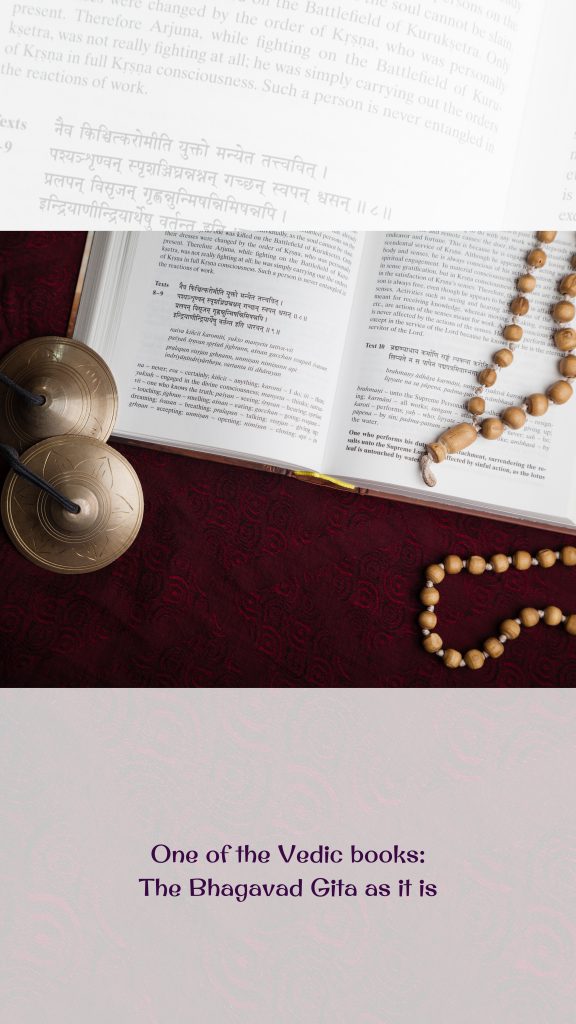As I am always searching for ways and techniques to improve my condition Long Covid, one of the facilitators in the Gita Circle pointed out an organisation based in India.
The 21-Day Health Challenge by Satvic Movement, founded by Subah Jain and her team, guides participants through a comprehensive health transformation using principles rooted in natural healing and Satvic (pure) lifestyle practices. As I was looking to make the changes in diet and lifestyle dealing with Long Covid easier, I did everything I could to join the classes. It was tough, and even if I mainly joined in pyjamas, I was eager to learn things to increase my quality of life.
When I first heard Subah say, ” You are going to set your alarm at 5 am tomorrow,” I thought “, Are you crazy? Do you know how hard it is to live with Long Covid and sleep all those hours during the day?” Yet I tried; I got up at five and returned to bed within 30 minutes.
It was not until I heard an Indian priest say, “When you sleep before 11 pm, the hours count double.” I didn’t believe this and thought: “I haven’t tried this. What if it works?”
When I shared my thoughts with the other facilitator of the Gita Circle, she told me that the time before sunrise was auspicious and highly beneficial. She had given me helpful advice on improving my health multiple times, so I found it worth a try.
Not long after this tryout, I spent four nights at the Ashram, where everyone got up even earlier for mangala arati (morning prayers). This made it easier for me to proceed and install this new habit, even if I needed to go back to sleep multiple times during the day. The time when the world is still asleep became my favourite time of day.
Getting up and sleeping early is emphasised in both Vedic scriptures and modern research for its numerous benefits to health and well-being. Here are some insights from both perspectives.

The Vedic Scriptures
Brahma Muhurta: According to Ayurveda and Vedic texts, waking up during Brahma Muhurta (approximately 1.5 hours before sunrise) is highly beneficial. This time is ideal for meditation, yoga, and spiritual practices. The calm and serene atmosphere is believed to enhance concentration and inner peace.
Rituals and routines: The Vedic scriptures advocate a structured daily routine (Dinacharya), including early rising. This routine aligns with the body’s and the environment’s natural rhythms, promoting balance and health.
Health benefits: Waking up early is associated with better digestion, mental clarity, and overall vitality. The Vedic texts link early rising to the balance of doshas (body energies: Vata, Pitta, and Kapha), essential for maintaining health.
Spiritual growth: Early mornings are considered a sacred time for spiritual growth. Practices like meditation, prayer, and studying sacred texts are believed to be more effective during this period due to the heightened state of awareness and tranquility.
Modern Research
Circadian rhythm: Modern research supports aligning daily activities with the body’s natural circadian rhythm. Going to bed early and rising early helps synchronise the internal clock, leading to better sleep quality and overall health.
Mental health: Studies have shown that early risers tend to have lower levels of stress and depression. Exposure to natural morning light can regulate mood and improve mental health.
Physical health: Consistent sleep patterns, with early sleep and wake times, are linked to reduced risk of chronic illnesses such as obesity, diabetes, cardiovascular diseases, and improved immune function.
Productivity and performance: Waking up early is often associated with higher productivity, better performance, and improved cognitive function. The early hours provide a quiet, uninterrupted time to focus on essential tasks.
Hormonal balance: Early rising helps maintain hormonal balance, particularly stress-related hormones (cortisol) and sleep (melatonin). This balance is crucial for overall well-being and functioning.

Integrating both perspectives
Create a routine: Establish a daily routine that includes early rising and bedtime. This can involve setting a consistent wake-up time, engaging in morning activities like yoga or meditation, and winding down in the evening with relaxing activities.
Morning practices: Incorporate practices recommended by the Vedic scriptures, such as meditation, pranayama (breathing exercises), and studying spiritual texts, into your morning routine. I added that I was working on my book “Blessed with Long Covid” as morning is the best time to progress my writing.
Healthy lifestyle: Maintain a healthy lifestyle by eating a balanced diet, staying hydrated, and engaging in regular physical activity, all emphasised in Vedic and modern health advice.
Environment: Create a conducive environment for sleep by minimising exposure to screens before bed, keeping the bedroom dark and cool, and using calming techniques to prepare for sleep.
Mindfulness and gratitude: Begin and end your day with mindfulness and gratitude practices to enhance mental and spiritual well-being.
By integrating the wisdom from Vedic scriptures and insights from modern research, one can achieve a harmonious and healthy lifestyle that promotes physical and spiritual growth. For me, this means eating dinner between 5 and 6 pm, slowing down and shutting down outside disturbances and screens after 7 pm, and being in bed at 9 pm.
Breaking the chain by breaking my evening routine directly affects my health, and it takes about a month before I get a bit of my routine back. I cannot prevent this from happening, as outside forces make me cross my boundaries easily, which causes a PEM (Post-exertional malaise). My routine is the base for the other habits I try to maintain, so when I experience a PEM, the routine I worked really hard for falls away. I have never been allowed to keep my habits longer than three weeks.
Long Covid causes small things in mental and physical activities to give the effect of a flare-up or PEM. The setbacks become harder every time I experience them. Surrendering to the almost impossible remains a challenge. While I can sleep better after a short walk, during the day, my brain gets easily overstimulated by reading and responding to emails, which keeps me awake while resting and sleeping are advised and needed. More about this topic will be discussed in my next blog post.

This is so cool! I appreciate all the info around sleep – I always knew sleep before 11 was good for you. I just didn’t know all the reasons why. ?
Even more reasons to go to bed early – I am always up early love the feel of the early morning before everything awakes ??
Lieve Daphne, ik heb je hele verhaal gelezen. Ik krijg steeds meer respect voor jou door jouw doorzettingsvermogen. Ook je strakke levensritme vind ik bewonderingswaardig!
❣️❤️ Rising before sunrise feels like such a sacred alignment. Truly impressed you embraced this. 🙏